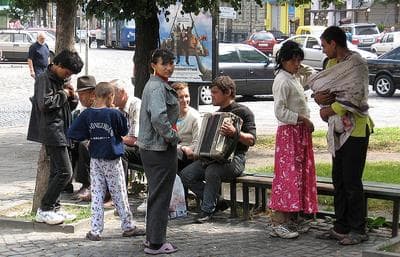Advertisement
Who Are The Roma?
Resume
With multiple stories in the news about the Roma, writer Isabel Fonseca joins Here & Now’s Robin Young to discuss the history of the Roma — historically known as Gypsies – and the discrimination they have faced.
Fonseca spent four years with Romani people from Albania to Poland before writing "Bury Me Standing: The Gypsies and Their Journey."
The term Gypsies is now sometimes considered pejorative. The word 'gypped' is supposed to have come from the word Gypsy.
"Gypped means to be ripped off, or to steal," Fonseca said. "The assumption is always that there is some criminality."
"You cannot overstate the discrimination against Roma in Europe, and the degree of poverty."
'Alarming' rhetoric in Greece
The case in Greece recently involved a little blonde girl, known as Maria, who was found when Greek police conducted a raid on a Roma camp, initially looking for drugs and weapons.
Because Maria bore no resemblance to the couple that claimed to be her parents, the police became suspicious.
DNA testing has shown the couple is not related to the girl, and Greek authorities have charged them with child abduction.
Fonseca finds the rhetoric in the Greek case problematic.
"What I find alarming is the glee with which it's been seized on, as proof of a genetic disposition to criminality," Fonesca said. "Another thing that immediately struck me is that whenever a country is in great economic disarray, like Greece, it is not surprising that [Roma] are going to be covering the front pages. Because they really are a handy scapegoat for all the ills in a given society."
A history of legislated discrimination
Fonseca says that while criminality certainly is an issue with the Roma community, it is often misrepresented.
"I don't want to skirt the issue of criminality, but I'd like to put it in a certain context," she said. "You cannot overstate the discrimination against Roma in Europe, and the degree of poverty."
European governments practice what Fonseca calls "enforced segregation" against its Roma population, including creating separate schools for Roma children. She also adds Roma have had a "historic relationship with authority that is entirely negative," which leaves Roma, understandably, unwilling to cooperate with European authorities.
"It is not endemic to their culture to be outside the mainstream," Fonseca said. "It's just that they are, and it's self reinforcing."
Education as the key to integration
Fonseca says the only successful program in Europe that integrates Roma with the mainstream population is Ovidiu Ro, in Romania, which involves getting Roma children to attend preschool. The end result is that families also become integrated.
"The discussion really should be about how we're living in a way that the have-nots are so far down the totem pole," Fonseca said. "We all know that education is the key to changing attitudes towards people."
Guests
- Isabel Fonseca, author of "Bury Me Standing: The Gypsies and Their Journey"
This segment aired on October 24, 2013.